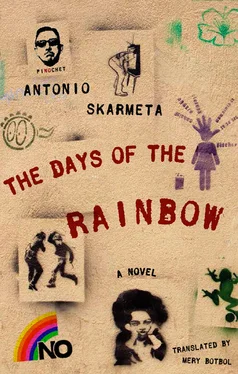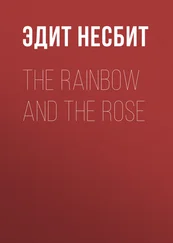And he had done the TV campaign without answering that question. Actually, sponsoring joy so blatantly, with a waltz by Strauss and a parade of lunatics saying No in multicolor, not having made room in his images for a single tear, knowing, as he knew, that in that precise moment Chile was crying! Everything had been a mistake.
He had given himself up to an irresponsible fiction. A desperate way out. Trying to leap into the void without a net. He explained to Olwyn that Pinochet had had total control of the media for fifteen years to impose his orders on TV screens. But he was given fifteen minutes, only fifteen minutes, a handful of seconds to break, once and for all, the relentless assault of dictatorship.
He didn’t have time for subtleties. It was fifteen minutes against fifteen years. And of those fifteen minutes, almost five were dedicated to the insanities of the “Waltz of the No .”
By dessert, Nico Santos’s napkin looked like the canvas of a sunken sailboat. Bettini didn’t want to comfort him. He wished he could be comforted himself. Impatience demolished him. On the screen, the images of the Yes campaign were flowing — hooded terrorists with bombs in their hands throwing stones at car windows: that was the joy of the No coming up. Chaos, the rape of teenagers, children slaughtered by a red bulldozer. The same way he was playing the card of the joy of change, Pinochet’s ad agents were staging the hell of debauchery.
He didn’t want to wait the few remaining minutes. Watching his images flow in front of his family would surely embarrass him. He grabbed Nico’s napkin and tossed him his own. He put the wet cloth in his jacket pocket and announced to the group that he was going out for a walk.
“What are you going to do?” Patricia asked, suddenly standing up.
“Just what I said. A walk.”
“But, Daddy. This is your shining moment. All of Chile is glued to the TV screens at this very moment.”
“That’s the problem, honey — everyone will see that their emperor is naked. I’m not in the mood for another hara-kiri.”
“Dad, what are you really up to?”
“I’m taking a walk!”
Magdalena threw herself on him and challenged him to look her in the eyes. “Patricia’s right. Where are you going?”
He squeezed Nico’s wet napkin in his pocket.
“I won’t throw myself in the Mapocho. At this time of the year, there’s not even that much water …”
“So?”
“I’m just going to take a walk, ladies. A simple and athletic walk to breathe some fresh air.”
Embarrassed, Nico stood up, and walked to the bathroom. “Excuse me.”
Bettini responded with a blink of his eyes.
“You should take better care of him. Right now, he has no one to call his own.”
He felt like slamming the door but decided to be gentle, closing it as if he were kissing it good-bye.
The night was cool. He buttoned his shirt’s top button and looked at the moon, fractioned by the branches of the trees. He had always lived in Ñuñoa. He had the habit of feeling and admiring the old cobbled streets. The grand old trees grew without control, inhibiting the arborists with their height. There was something successfully familiar in this middle-class neighborhood. His street was far away from the supermarket, the malls, and the stops of the main bus lines.
On the corner, there was a grocery store whose owner still paid something for empty glass bottles. And when the kids went to buy bread or oil for their mothers, he still gave them a candy or a bubble gum as a bonus.
The guy from the newsstand kept the Sunday paper for him till noon, because he liked to stay in bed until lunchtime, and if he didn’t go to pick it up, the guy rang his doorbell and handed him El Mercurio with a cheerful smile.
He had credit at the Chinese restaurant on Manuel Mott Street, and if he didn’t have enough to invite Magdalena and Patricia for dinner, old Tin-Lung, laughing out loud, would write down the check amount in a huge notebook with a calendar picture of Marilyn Monroe. Everything had remained the same since his childhood, except for two details.
The TV antennas in every window, launched into the clouds.
And the Italia movie theater.
After going bankrupt, its 35-mm projector had been sold at a flea market. Those premises were now in the hands of some evangelical Christians, dressed in brown suits, white shirts, and ties, and with tons of hair gel, even in the hottest summer. Their wives, skinny, with olive faces. Some of them wearing socks up to their knees. It was still possible to see under the cobbles the tracks of the tramways that had stopped working decades ago. His neighborhood had witnessed his furtive kisses to the prettiest girl on Antonio Varas Avenue. And the day he turned fourteen, the blond girl with untidy curls who worked at the unisex hair salon allowed him to do everything on a Friday night, after closing the door behind her last customer. Then, cleaning his surprised sex with a wet towel, she whispered in his ear, “Happy birthday.”
That was his Santiago. The splendor of democracy and street demonstrations. As a student, he had shouted along with thousands of citizens, “Allende, Allende, your people defend you.”
In front of the police academy, on Antonio Varas, he had seen the tanks of the coup d’état, going to La Moneda. He had been awakened by the fighter planes that were going to bomb the palace.
The same week he had been obsessed with Bob Dylan’s song, “Don’t Think Twice, It’s All Right.”
So was that his style? Every historical episode came with the emotion of a particular melody, of the lines of a poem. Of course, one thing had nothing to do with the other. One was reality, and the other was fantasy. Dreams. Dissolving foam. Thin clouds.
Even though his pace was firm and energetic, he realized that his efforts were in vain. As he walked down the side roads under the smell of spring jasmines, the “Waltz of the No ” was coming out from the windows of each one of those houses and apartments.
Paradox: he had fled that circus, and now he was overwhelmed by hundreds of TV sets.
In the vegetal darkness of the bushes, the TV screens flashed like ghostly sparks. He felt like a condemned man walking to the gallows who has to bear one more agony — to hear the music of this infamous life at a high volume.
My goodness! Oh my God, my dear God , he thought, as he started to run without any direction. All of Santiago is watching it!
Soon enough, sweat bathed his pale face. Although he felt his heart pumping way too fast, he didn’t slow down. His heart was showing him the right way. His much desired end. Just like on New Year’s Eve when the fireworks crossed the sky, he was now having his own fanfare — the flashes from all the screens in all the Chilean homes that were witnessing his fifteen minutes of fame, his absurd and ridiculous libertarian song.
There was no need to throw himself to the Mapocho, jump from a building’s terrace, hang himself from a tree, fall under the wheels of a bus.
Everything could be much neater — keep running and running until his heart exploded like a grenade.
Suddenly, the music stopped, indicating that the ad for the No had ended.
Now the ordeal would begin.
In that precise moment, all the inhabitants of his country, the sailors at sea, the rebellious students, the sons and grandsons of the executed and the disappeared, their mothers and girlfriends, would be puzzled, looking at each other, wondering, “What was that?”
No! “What the hell was that?”
The desired end.
His own apocalypse.
The ignominy of his entire career.
He was exhausted. When he arrived at the square, he stopped near a fountain and let the drops of water splash his face.
Читать дальше











